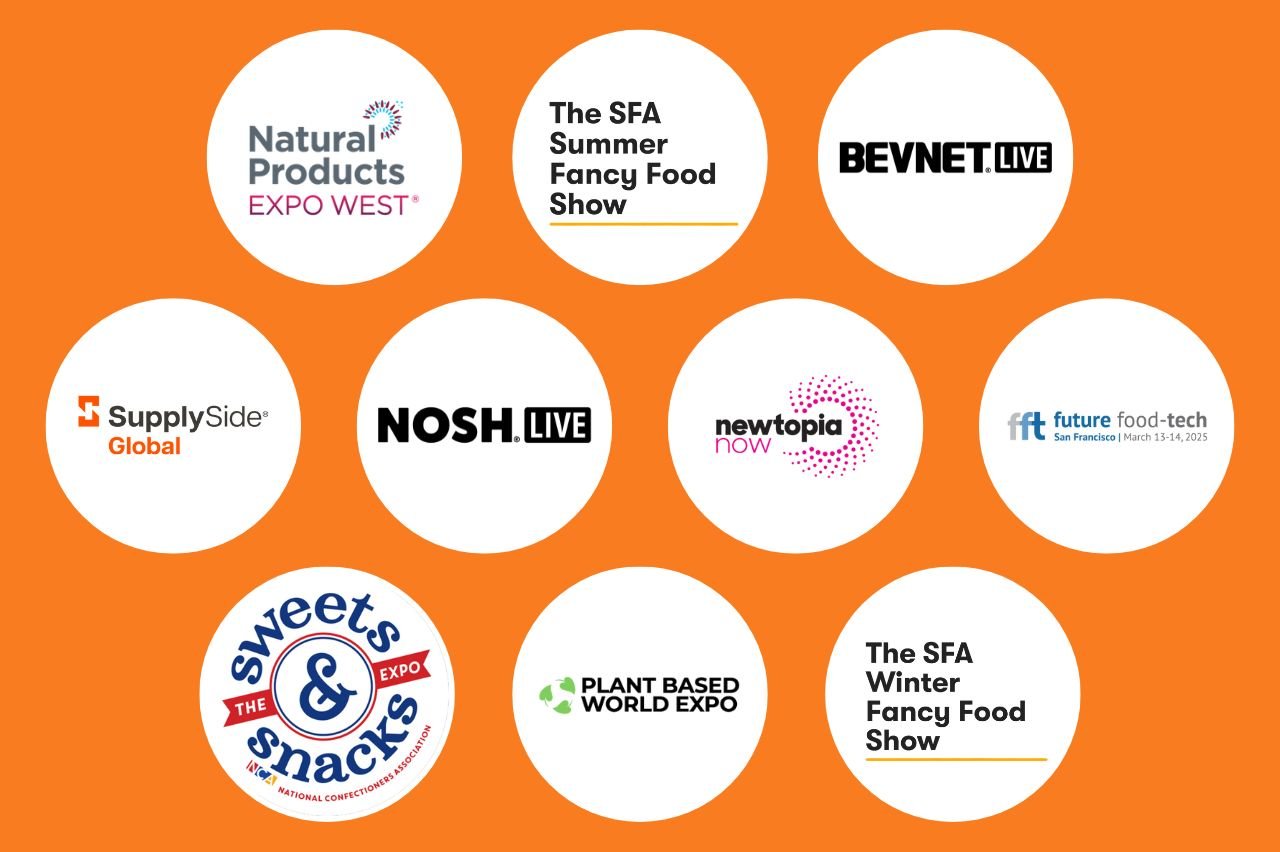Organic Food Product Marketing | Expert Social Media Tips

If you’re in food marketing, particularly focusing on organic food and beverages, your social media marketing strategy is key to growth. Let’s delve into how you can master social media to promote your organic food products and captivate eco-conscious modern consumers.
This is Social Media 101 for Organic Food and Beverage Brands. But first…
What is Organic Food Product Marketing?
Simply put, it’s the promotion of food and drinks made without synthetic chemicals or artificial ingredients… Which represents a small (but growing) segment of the food market.
Organic food product marketing targets consumers who prioritize healthy eating and environmentally friendly products. Typically, they’re medium to high earners who are willing to pay extra for premium products.
We’ve all seen the food advertising: Food marketers focus on the natural qualities and environmental benefits of these products to attract customers who value these aspects. Here’s how to pull off an effective marketing campaign without being accused of ‘greenwashing’ or ‘being fake.’
Identify Your Target Market
There’s no point in advertising your organic food products without understanding who your ideal customers are. It’s essential that you choose the right platforms and create content that resonates with this demographic. Otherwise, it’s impossible to tailor your messaging in a way that connects with buyers on an emotional level (where the wallet lives). Without a clear target market, your marketing efforts can be too broad, resulting in wasted resources and less impactful campaigns.
Factors like age, gender, location, income level, and lifestyle should be taken into account when considering consumer behavior and consumer preference. For example, if you’re selling a new product like organic snacks, your target market might include health-conscious Millennials aged 25-35 who live in urban areas, have a higher disposable income, and are interested in fitness and wellness. But don’t stop there. What’s their stance on climate change? Do they bike to work? Are they blue or white collar workers? Are they more likely to binge dramas or reality shows?
Psychology plays a major role in effective organic food product marketing. Reading between the demographic lines will help you craft truly impactful messaging that influences consumer choice.
Some target markets could include eco-conscious families who prioritize sustainable living, young professionals who seek convenient yet healthy food options, or fitness enthusiasts who look for clean, organic ingredients on the food label.
The endgame is targeting these groups where they spend most of their time – on social media. In 2024 and beyond, this is the most important channel for boosting sales and building brand loyalty.
Social Media Tips for Marketing Food Products
Instagram, Facebook, TikTok, Pinterest and other platforms let you reach more people, establish brand recognition, and connect with your target audience. In fact, billions of dollars are spent every month to help companies do this. Remember when social media platforms were simply channels to help people connect? Those days are gone. More than anything, these are marketing platforms.
In the next sections, we’ll go over some simple social media tips that can help you improve your food product marketing, connect with customers, and boost your sales.
1. Get Personal – You’re Selling a Lifestyle, Not Just a Product
Don’t be overly formal; let your content breathe with authenticity. Imperfect, ‘real’ content is all the rage these days.
“Share behind-the-scenes moments, the quirky anecdotes, and the genuine stories that showcase the human side of your brand.”
Say goodbye to rigid formalities. Organic food audiences don’t want to hear a perfectly polished corporate spiel.
They want to engage with real people, especially consumers who love organic products. After all, organic is a desire to return to rid ourselves of man-made creations that disconnect us from the earth and an authentic relationship with how our food is sourced.
2. Highlight Your Unique Brand Flavors
In a world dominated by corporate giants, your small company brings that cherished mom-and-pop feel to the table.
Embrace it!
“Highlight what sets you apart.”
Maybe it’s your commitment to sourcing locally, your handcrafted process, or your founder’s personal touch. Celebrate these distinctive flavors and let them shine on your social media platforms.
3. Storytelling with a Twist
When you think of storytelling, you probably think of telling your brand’s story. Highlighting the founder’s journey, their passion for organics, and the pivotal moments that led to the birth of your company.
This is one way to tell your story on social media, however these days, customers are less interested in your origin story and more interested in your transformation story!
“People don’t buy products, they buy a transformation. This is doubly true for organic food consumers.”
Help your customer envision how your product will help them by telling them how your product will improve their life in some way. After all, that’s what organic product marketing is all about. Consumers aren’t spending more money just because they like the pretty food packaging. Earn their trust by proving to them your organic product will improve their lives.
Unlike your origin story, where the brand is the main character, in the transformation story your customer is the main character.
4. Influencers with a Heart
When it comes to influencer marketing, choose influencers who align seamlessly with your brand’s values.
Seek out those who resonate with your lifestyle-driven approach rather than simply product pushers.
Their authentic endorsements will create a genuine connection with your audience.
“Influencer marketing is a major driver of brand awareness in the food and beverage space, so take advantage.”
But be picky! Don’t let just anyone share your organic message. Consider partnering with a popular food blogger who aligns with your brand values.
5. Educate and Inspire with a Dash of Imperfection
Use your social media platforms as a canvas for educating your audience about the benefits of organic products.
“Imperfections add to the charm. ”
Because here’s what modern consumers think in 2023: polished, phony videos are for big brands like Heinz and Kraft, who don’t give a damn about their customer’s health.
Share spontaneous moments of discovery, the trials, and tribulations of your organic journey, and engage your followers in a learning experience that’s genuine and relatable.
6. Sustainability in Action, Behind-the-Scenes
Showcase your brand’s unwavering commitment to sustainability.
Display your eco-friendly packaging, energy-efficient operations, and sustainability initiatives as an ongoing, real-time journey.
“Consumers crave authenticity, especially in the organic food space, and they’ll admire your dedication.”
But don’t greenwash: brag about your sustainable practices by highlighting them in video form. The proof is in the organic pudding!
7. Engage Like Old Friends
Talk to your audience like old friends rather than work colleagues.
Respond to comments, seek their feedback, and encourage open dialogue.
It’s not just about selling; it’s about building a community that resonates with your lifestyle-driven approach. Remember that the organic food culture is all about localizing food and rebelling against the corporate greed that has shortened the lives of multiple generations by prioritizing profits over quality products.
“Perhaps most importantly, embrace negative feedback.”
Turning a dissatisfied customer into a brand advocate in a public forum will elevate your organic food and beverage brand.
8. Showcase What Matters
As you create content, showcase what truly matters.
“Highlight your organic ingredients, your sustainable sourcing practices, and the genuine farm-to-table journey.”
Authenticity is the magic ingredient that keeps your audience hooked. The wonderful people who make your brand possible is a great way to start: if they’re open to it, showcase them on social media.
9. A Dash of Quirkiness
Inject some quirkiness into your content mix.
“Surprise your audience with unexpected moments, witty captions, and playful posts.”
These elements add that ‘real’ and imperfect touch that trends so well on social media.
10. Data and Adaptation
Use your social media platforms as a canvas for educating your audience about the benefits of organic products.
Imperfections add to the charm.
Share spontaneous moments of discovery, the trials, and tribulations of your organic journey, and engage your followers in a learning experience that’s genuine and relatable.
Never ignore the data. Analyze your social media metrics to see what’s resonating with your audience. Adapt your strategy based on these insights. The journey to success is a dynamic one.
“Organic Food and Beverage Brands – Go Forth and CRUSH IT on Social Media.”
Nailing social media for organic food and beverages is all about capturing the essence of your brand’s lifestyle-driven approach.
Through storytelling, authenticity, and a dash of quirkiness, you can effectively engage with eco-conscious consumers and carve a lasting impression in the organic culinary landscape.
If you’re ready to embark on this social media journey, we’re here to accompany you every step of the way. Let’s connect and explore the limitless possibilities for your brand in the realm of organic excellence!
Remember, successful food marketing in the digital age goes beyond just social media. Consider incorporating email marketing and other digital marketing strategies to create a comprehensive approach to marketing food products and building brand loyalty.


